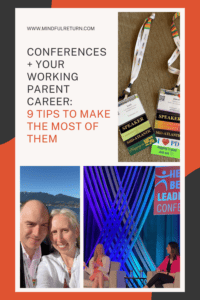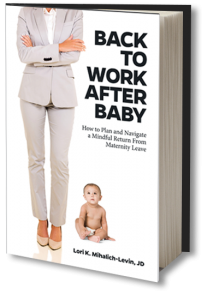 Have you been to any work-related conferences lately? For most of us, Covid put a pause on in-person conference-going. But if my own schedule over the past few months is any indication, these large events are now back in full swing. If you haven’t put one on the calendar for the upcoming months, I’d urge you to do so! (Yes, even if you’re feeling reluctant about it.)
Have you been to any work-related conferences lately? For most of us, Covid put a pause on in-person conference-going. But if my own schedule over the past few months is any indication, these large events are now back in full swing. If you haven’t put one on the calendar for the upcoming months, I’d urge you to do so! (Yes, even if you’re feeling reluctant about it.)
As an introvert-leaning ambivert working mom of two, the thought of attending conferences always fills me with conflicting emotions. On the one hand, I know how exhausted I get from being surrounded by hundreds or thousands of (germ-carrying!) people. Travel snafus are common and trying. For example, I just got stuck in Denver for many hours on a layover delay, where my gate was changed no fewer than 10 times before we finally took off! And being away from my kids creates logistical and emotional challenges.
On the other hand, though, there’s the unparalleled energy of being together with like-minded humans. The excitement of learning new things from engaging presenters. The potential to advance conversations and projects so much more quickly than while holed up in my home office. Exploring new places. Hugging people I haven’t seen in ages. And yes, definitely feeling glee in not having to wash dishes, be awakened by a small person, or make sure homework gets done.
I’m writing this as I fly back to Washington, DC, from my second conference in two weeks. One was in Vancouver and the other was in Las Vegas, so my head has been in a perpetual state of time confusion. I wouldn’t necessarily recommend attending back-to-back conferences. But that timing can’t always be helped.
 A “first” for me, I also attended the Vancouver conference as a “work date” with my hubby. He and I somehow both wound up speaking on different panels at the same event. And GOSH was it fun to be away together! I highly recommend the joint-conference-going with a partner, if you can ever swing it.
A “first” for me, I also attended the Vancouver conference as a “work date” with my hubby. He and I somehow both wound up speaking on different panels at the same event. And GOSH was it fun to be away together! I highly recommend the joint-conference-going with a partner, if you can ever swing it.
9 Strategies to Help Conferences Work for You + Your Career
As I head home, I’m full of ideas on how to make conference-going a more enjoyable personal experience, and one that can also be a huge boost to your career. Particularly as a working parent, it’s easy to say “I don’t have the time or energy to go to something like that right now.” I hear you on the exhaustion. I’m here to say, however, that a well-selected conference could perhaps just be the thing you need to get into a different head space for a few days. To take a small break from your parent identity. And to get excited about your career again.
With that, here are 9 strategies I recommend:
 Submit proposals to speak at conferences. Why am I starting with this one, knowing you’re probably going to say, “no thanks, not me!”? Because speaking on a panel at a conference is the easiest way to (1) make a case to an employer for attending a conference (registration fees are often waived for speakers, and being on a panel makes your employer look good!); (2) build credibility and a professional reputation; and (3) commit to going, even when part of you wants to back out of it.
Submit proposals to speak at conferences. Why am I starting with this one, knowing you’re probably going to say, “no thanks, not me!”? Because speaking on a panel at a conference is the easiest way to (1) make a case to an employer for attending a conference (registration fees are often waived for speakers, and being on a panel makes your employer look good!); (2) build credibility and a professional reputation; and (3) commit to going, even when part of you wants to back out of it.
Consider the associations you belong to (or may want to belong to). When do they meet? When do they post calls for proposals? Where will they be meeting? What conferences do your colleagues attend? Which conferences do the people whose careers you wish you had attend? What conferences do your competitors attend? Plan now to submit proposals that can land you speaking opportunities next year.
Fear of rejection? Remember that the more hats you throw into the ring, the more likely you are to be selected. Also start small and build up experience to larger venues.
Think you don’t like public speaking? Here’s how to get over some of those fears.
- Make the case, and advocate for budget to attend. First, get your head in the right place to make an ask for the time and budget to attend a conference. What do you I mean? Consider your own professional growth that can come from attending a conference, and get excited about the possibility of attending! (You’re more likely to make a better case when you really want to go.)
Then do your homework. Identify the conference that looks like it will provide the best learning opportunity for you and the best ROI for your employer. Consider the financial context. (Yes, budgets are tighter these days.) But you can still look for creative sources of funding, like professional development budgets that have already been allocated. Consider local conferences so that travel expenses won’t be an issue. Even if it’s not built into this year’s budget, can you ask for funds to attend next year, when you have your annual review process?
- Read our tips for going on work travel when you have little ones. I’ve been the mom pumping on an airplane, and arriving with wet eyes from missing my baby. I know how hard it can be to go away for a few days, particularly when children are little. AND, there are amazing benefits to going despite the hardships. It’s okay to feel guilty and to go anyway. Our leaving offers immense growth opportunities for our partners and others in our villages, and it often forces those of us who are mothers to relinquish some “maternal gatekeeping” tendencies.
Read more here on navigating the complexities of work travel when you’re a working parent. I recorded a short talk on this issue on Insight Timer entitled “Work Travel as a Working Parent”, too.
- Spend time (yes, a few hours!) mapping out your plan before you go. This tip comes directly from my career coach husband, Jason Levin. Before we attended our “work date” together, he walked me through his process of conference preparation. This planning process involves setting up an Excel file that contains both the logistical information related to the conference (hotel, flight info, etc.) and also a list of all the people you’d like to meet. Many conferences will post or share a list of attendees. Walk through the list to see who you know, and who you’d like to have a chance to meet with. Reach out to them via e-mail or LinkedIn and track your outreach in the Excel file. Set specific meeting times with those who say yes. Once you figure out your schedule, get that into your spreadsheet, too.
I initially groaned at the amount of work Jason was suggesting, even before I attending a time-consuming conference. And yes, this did take a few hours. But following Jason’s plan had two huge benefits for me. First, it allowed me to make the best use of my time at the conference, rather than simply hoping I’d run into people I wanted to see or meet. And second, being prepared and knowing who I was going to meet with significantly reduced my anxiety of being in a big crowd.
As you plan, don’t forget to think through your conference wardrobe, too. Comfy shoes and jackets or scarves for warmth in chilly conference center rooms are a must!

5. Tie a small knot at the top of our conference badge lanyard. Yes, this is a small and silly tip. But it’s a good one! When you get to the conference and check in, you’ll often be given a badge and a lanyard that allows you to wear the badge around your neck. I’m sure the length of the lanyard is appropriate for some people, but for many others (myself included), it hangs so low that it disappears into my lap. Not helpful if no one can ever see your name! If you tie a small knot in the back of the lanyard, though, it boosts the name tag up a bit to a more appropriate level. You’re welcome.
6. Engage in daily steadying practices while you’re there, and monitor your energy. I first wrote this strategy as “continue your daily self-care practices while you’re there.” But I quickly realized that for many parents of little ones, specific daily self-care practices are sometimes more aspirational than reality. So I’m modifying this advice.
Regardless of what you normally do in the chaos of your own home, identify for yourself and engage in a daily steadying practice. Something that will ground you when the energy of the conference is too high. And when you’ve been thrown out of your routine. I bring my yoga mat on every work trip. I get on it every morning for a short practice, and it’s my reassuring piece of home. No matter where I am.
Also monitor your own energy level throughout the conference. Yesterday, I spent the whole day sitting in sessions and found myself completely wiped out by evening. When someone suggested a post-dinner plan, I politely declined in favor of a bit of alone time and more sleep. You have the right to set your own boundaries while you are there.
- Post and share about the conference (and your attendance at it) on social media. I admit I struggle with this one. But I follow the mantra, “cringe, but do it anyway.” Why? Because I know there are good reasons for posting, particularly on LinkedIn, regardless of how I’m feeling.
What are some of those good reasons? Career and personal-brand building. People will remember you for the skills and interests you share. You build credibility in your professional communities when people know you attended. And you give others who weren’t there at the conference ideas about your capabilities. You can also use social media as a way to celebrate other speakers’ successes and to highlight your own employer’s brand. In my opinion, one post per day on LinkedIn is plenty, and it’s okay if you post after you return home. Just document it at some point.
- Remind yourself why you’re going – and then, why you’re there. When I’m feeling the guilt of leaving, the exhaustion of being at a conference, or frustrated by the work that built up in my absence, this strategy really helps. Whenever you find yourself getting agitated by something conference-related, ask yourself, “why did I decide to come?” Then articulate a response. Write it down if you’re really stuck. I promise you there were good reasons you decided to do this. You just need to remind yourself of them.
- Block time for follow-up after conferences. Anya Smirnova, the lead of our Mindful Return UK Chapter, recently attended a conference in London. Afterward, she said she was struck by the amount of time it took for post-conference follow-up. When you get back, you have work waiting for you that piled up while you were gone, yes. But, if you made the best use of your time at the conference to meet and speak with others, you’ll have a ton of next steps, too. To the extent you can block time – a day or two if possible – for when you get back after a conference, do it. If the next conference you’re attending is a few months off, it’s much easier to claim or block that time now, rather than waiting to try and hold it when the conference approaches.
So now, go forth and put a conference or two on your calendar for sometime in the next 12 months! I work very intentionally not to put things on my calendar that aren’t worth the effort. Attending conferences passes that high bar for me, though. The juice, as they say, is worth the squeeze.
Want more practical tips on working parenthood? Check out my book, Back to Work After Baby: How to Plan and Navigate a Mindful Return from Maternity Leave


